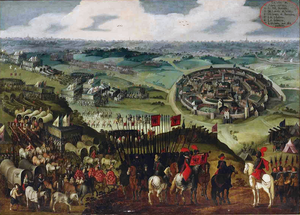War of the Jülich succession
| War of the Jülich Succession | |||||||
|---|---|---|---|---|---|---|---|
| Part of Eighty Years' War | |||||||
 The siege of Aachen by the Spanish Army of Flanders under Ambrogio Spinola in 1614. Oil on canvas. Attributed to Pieter Snayers. |
|||||||
|
|||||||
| Belligerents | |||||||
|
1609–1610:: Prince-Bishopric of Liège |
1609–1610: Protestant Union |
||||||
|
1614: |
1614: |
||||||
| Commanders and leaders | |||||||
|
1614: |
Otto von Solms–Braunfels 1614: |
||||||
The War of the Jülich Succession was a military conflict over the right of succession to the United Duchies of Jülich-Cleves-Berg. It lasted between 10 June 1609 and 24 October 1610, resuming in May 1614 and finally ending in 13 October 1614. The first round of the conflict pitted Catholic Archduke Leopold V against the combined forces of the Protestant Margraviate of Brandenburg and Palatinate-Neuburg, ending in the former's military defeat. The representatives of the Brandenburg and Neuburg later entered into a direct conflict after their religious conversion to Calvinism and Catholicism respectively. The conflict was further complicated by the involvement of Spain and the Netherlands making it part of the Eighty Years' War. It was finally settled by the Treaty of Xanten, provisions of which favored Spain.
The rapid spread of the Lutheran and Calvinist doctrines following the schism of Roman Catholic Church was met by a period of Catholic resurgence known as Counter-Reformation. Such interdenominational conflicts as the Cologne War and Strasbourg Bishops' War prompted creation of the Catholic League and the Protestant Union, with the intention of safeguarding the interests of the Holy Roman Empire's Catholic and Protestant nobility respectively. The aforementioned alliances entered their first conflict in 1609, when a succession crisis in the United Duchies of Jülich-Cleves-Berg sparked the War of the Jülich Succession. The territories in question covered an area of 14,000 km², having both geopolitical importance due to their proximity to the Spanish Road and a booming economy which was fueled by refugees fleeing the lands ravaged by the Eighty Years' War. The mentally ill duke Johann Wilhelm died on 25 March 1609, leaving no children to succeed him. Emperor Rudolf II had claims to the duchies stemming from intermarriage, however he was unable to openly declare his intentions without compromising his perceived neutrality. A total of six other claimants appeared, with rulers of the Margraviate of Brandenburg and Duchy of Palatinate-Neuburg having the only credible claims through their marriage to Johann Wilhelm's aunts. On 2 April, a regency was established, including the duke's wife Antoinette of Lorraine, the privy councilors and an imperial commissioner. On 24 May, Rudolf II announced that the Aulic Council was to provide a definite verdict within four weeks.
...
Wikipedia
